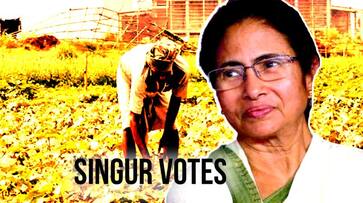The farmers' protest in the latter part of the last decade was against the Bengal government deciding to transfer land in Singur to the Tatas for the Nano small car factory. Their protest today is against the Bengal government for taking them for a ride. The difference is that the targets and supporters of the protest have swapped places.
Kolkata: Betrayal and hopelessness are two sentiments that are running deep among the voters of Singur as it goes to the polls.
Debjit Mondal trudged his way to the polling booth, albeit reluctantly, on Monday during the fifth phase of the Lok Sabha elections. His life over the last decade or so has seen many electoral promises for him to believe in the power of voting. Yet he chose to vote. You ask him who did he vote for. He won't answer.
About eight years ago, Mondal was part of an agitating group shouting slogans against the Left Front government of the time, marching with the workers of the Trinamool Congress (TMC) in Singur. Life has come a full circle for him. Last November, he was part of a CPI(M)-organised demonstration demanding 'justice' from the Mamata Banerjee government. Many of his former neighbours who took part in the Singur agitation have either moved close to the Left they once protested against, or the BJP, riding on the saffron surge in Bengal.
Singur today: Land with no use, abject poverty
The court may have ordered the return of the disputed Singur land to its original owners, but they did not get back what they had given away. Once fertile, the Singur land has now turned almost uncultivable. A long period of construction, involving storing cement and drilling with powerful iron machines, has left the land a 'dead body' as many farmers call it in Singur.

Farmers agitating against forceful land acquisition in Singur during the erstwhile Left regime in Bengal
Also read: How Singur farmers were taken for a royal ride to abject poverty
To complicate the matter, many had wanted industry in the first place. Not everyone had joined Mamata's agitation, in spite of the narrative peddled back then. Those who wanted a better future for their families, wanted to leap from farming to industry. They are irritated all the more.
Most of the farmers of Singur complain that except election time, they are hardly talked about. After Mamata came to power, she announced a monthly allowance, which was practically too little and delayed every month. And now that the farmers have their land back, they can hardly sow rice as they used to almost a decade back. Out of a total of 997 acres, only 30% is worth cultivating. What's worse, no company wishes to venture in Singur, given its reputation.
Singur helped Mamata, not its farmers
Singur remains a land of the have-nots. There are many Debjit Mondals seeking justice with the very power against which they had raised a revolution of sorts in the latter part of the last decade. Their protest at that time was against the Bengal government deciding to transfer land to the Tatas for the Nano small car factory. Their protest today is against the Bengal government for taking them for a ride. The only difference is that the targets and supporters of the farmers' protest have swapped places.
Also read: Hard for lawless Bengal to get investment at farcical global business summit
An agitation that was marked by anti-Buddhadeb Bhattacharjee slogans, Trinamool Congress flags and hatred for the Tatas made the bedrock for Mamata's rise to power as Bengal chief minister. She emerged a leader with far greater mass appeal than ever before, turning a farmers' protest into a mini-revolution and then duped the farmers with false promises. Mamata became the chief executive of her state, but the farmers of Singur lost their lands and self-esteem while no industry came up in the area either.
Last November, Mondal told MyNation, "We were here shouting slogans. We were determined to save our land from the Tatas. We did not want the Nano factory to come up here. But today we neither have the factory, nor a fertile land."
Singur drove out not only Nano but industry in totality from Bengal
Singur attracted international media attention since Tata Motors started the construction of a factory to manufacture their Rs 1 lakh car. The small car was scheduled to roll out of the factory by 2008. Ratan Tata was upbeat, or so stated the then commerce minister of Bengal Nirupam Sen. For the first time, the pro-farmer Left had openly endorsed industry as a means of livelihood.
The then chief minister Bhattacharjee shaking hands with Tata may have been a perfect photo-op to boost India Inc in eastern India, but his comrades in Kerala were not quite comfortable. Nor was Indian communism's famed 'Bengal line'. Old school communists like Biman Bose and Surjyakanta Mishra openly differed with Bhattacharjee.
The compensation amount was not enough for the farmers. Many did not want to sell their plots off in the first place regardless of the reparation. Mamata turned the farmer dissatisfaction into anti-establishment sentiment. What made life difficult for the Left Front was an incompetent administration under Bhattacharjee, who was more of an art aficionado and less of a politician — Bengal's IK Gujral, if you may. The Tatas had to shut shop and leave.
Today, as Singur votes, it votes with despair, hopelessness and in abject poverty.
Last Updated May 6, 2019, 4:37 PM IST









![Salman Khan sets stage on fire for Anant Ambani, Radhika Merchant pre-wedding festivities [WATCH] ATG](https://static-gi.asianetnews.com/images/01hr1hh8y86gvb4kbqgnyhc0w0/whatsapp-image-2024-03-03-at-12-24-37-pm_100x60xt.jpg)
![Pregnant Deepika Padukone dances with Ranveer Singh at Anant Ambani, Radhika Merchant pre-wedding bash [WATCH] ATG](https://static-gi.asianetnews.com/images/01hr1ffyd3nzqzgm6ba0k87vr8/whatsapp-image-2024-03-03-at-11-45-35-am_100x60xt.jpg)


